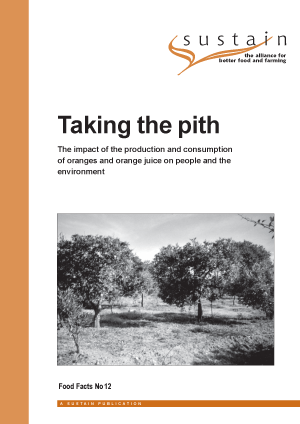Taking the Pith (Food Facts No. 12)
The impact of the production and consumption of oranges and orange  juice on people and the environment (2000)
juice on people and the environment (2000)
There is growing concern about the environment and farming practices, and how our food production and distribution systems may be contributing to problems such as transport pollution, global warming, ill health and loss of wildlife. The Food Facts series of reports provides information about the negative and positive effects of food production and consumption on our environment and society.
Report summary
- Spain is the fourth largest producer of oranges in the world. Most Spanish oranges are eaten as fresh fruit. Nearly all the fruit are consumed in Europe and are transported to their destination by road.
- Despite the large number of varieties and cultivars, the industry has concentrated on growing only a few popular varieties of oranges.
- Pesticides are frequently used on oranges and all the orange samples tested in 1998 by the UK government, which originate from a variety of countries, were found to contain residues of one or more pesticides. One herbicide, 2,4-D, was found on 57% of oranges and is known to be toxic to humans.
- Brazil produces a third of all oranges in the world of which 85% are used for orange juice. The Brazilian state of Sao Paulo alone accounts for half the world's supply of orange juice.
- Oranges in Brazil are frequently picked by children who work long hours for little pay.
- There are four main types of orange juice: concentrates, freshly squeezed, pure squeezed and orange juice drinks which can contain other additives such as sugar.
- Demand for orange juice has been continuously increasing by around 4% each year since 1990. In the UK, orange juice consumption has doubled in the last decade and is the most popular pure fruit juice drink: the average person drinking 13.9 litres each year. The United States drinks the most orange juice in the world at around 20 litres per capita.
- The United Nation's Food and Agriculture Organisation (FAO) believes that the consumption of orange juice (amongst other citrus juices) could help contribute to improved health. The FAO also recommends that communities should promote the consumption of citrus to improve the diet.
- 'Sunny Delight' is a drink with around 5% citrus content and is currently one of the top ten best-selling brands in Britain. 'Sunny Delight' contains around 9% added sugar, preservatives, added vitamins, colourings and flavourings.
- Proctor and Gamble, the manufacturers of' Sunny Delight', have teamed up with the United Nations Children Fund (UNICEF) to produce a very similar drink called 'Nutri Delight' which is fortified with iodine, iron and vitamin A. 'Nutri Delight' will be made available to child-care and health clinics in developing countries. It is supposed to improve the health of children, but critics argue that healthy food would do this better than a sugary drink with added chemicals.
- There have been many examples of orange juice being adulterated to increase the profits of orange juice manufacturers.
- Europe has started importing fair trade orange juice which has been grown and marketed according to strict regulations. These regulations include both minimum labour and environmental standards.
- Organic oranges and orange juice are now widely available in the UK. Different techniques are needed to grow these oranges to avoid using synthetic fertilisers and pesticides.
Published Monday 1 December 2003
Food Facts: A series of short reports on over a dozen different products, shows how people's shopping choices - as well as government policy - can protect the environment, enhance social justice and improve health.
